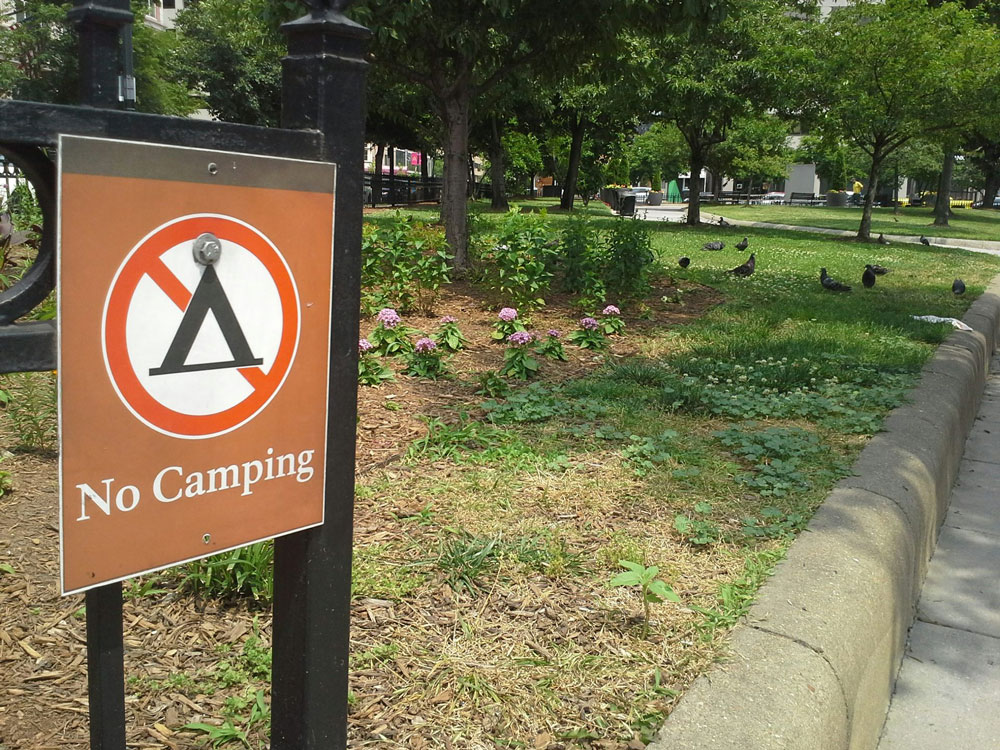
By Robert Rosenberger
Should cities be allowed to outlaw sleeping in public, even when there are no beds available in local shelters? This is what the U.S. Supreme Court will decide in its review of the case Grants Pass v. Johnson.
Lower courts have ruled that arresting someone for sleeping outside when there are no free shelter beds in the area is a violation of the Eighth Amendment, which protects against cruel and unusual punishment. In other words, it’s cruel to punish people who are sleeping in public if they have nowhere else to go, because sleeping is a normal and necessary human behavior. Now the Supreme Court justices will determine whether this ruling can stand.
Advocates for unhoused people argue these kinds of anti-camping laws effectively make homelessness a crime. If the Supreme Court overturns the ruling, this could intensify cities’ efforts to treat the unhoused as criminals.
As a professor of philosophy who studies homelessness, I believe it is important to understand camping bans as part of wider efforts to displace unhoused people. Cities do many things to assist people experiencing homelessness, providing everything from shelters to food pantries. Yet cities also use a variety of tactics to push unhoused people out of public view.
Perhaps the most revealing is “hostile architecture,” a focus of my research. This term is often used for public spaces designed in ways that discriminate against specific vulnerable populations. The most common examples are objects that present a physical barrier to everyday activities for people without housing.
Hostile design
One common example are spikes added to ledges to deter people from leaning or sitting. Since spikes are often quite noticeable, however, and their purpose is obvious, they occasionally elicit controversy.
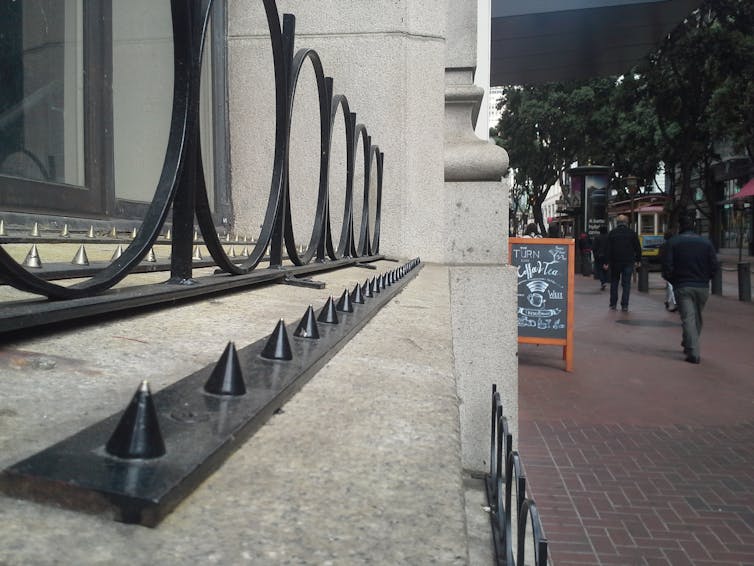
Robert Rosenberger
Another pervasive but less attention-grabbing form of hostile architecture are benches that have been redesigned to make them difficult or impossible to use as sleeping spaces. This is accomplished through a variety of design schemes that prevent people from lying down, from bucket seating or seat dividers to armrests.
Any number of other hostile physical obstructions can be found. Garbage cans are often fitted with hood designs, as well as external cases with built-in locks, to deter trash-picking.
Other designs alter the landscape itself. Bollards or boulders can be brought in to break up potential camping spaces. Fencing can be used to block off sheltered areas such as highway underpasses.
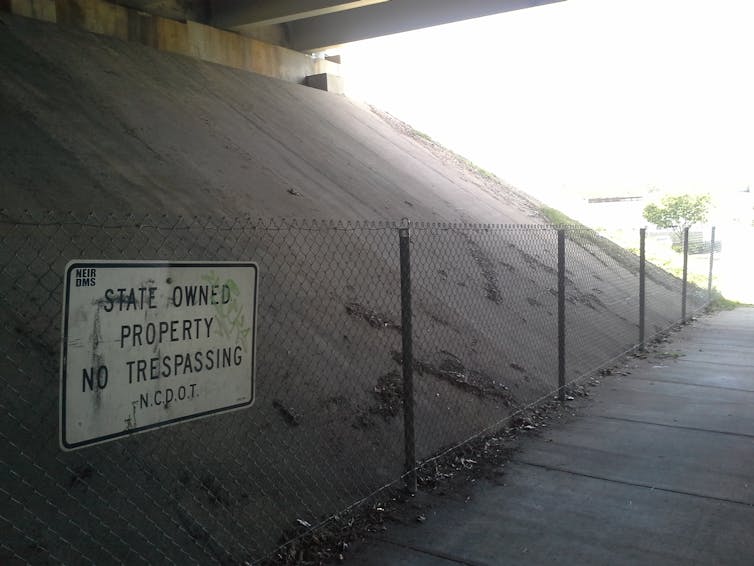
Robert Rosenberger
Hostile design isn’t always about objects; sometimes it involves actions, too.
Businesses and churches have been accused of regularly spraying water on potential sleeping spaces, sometimes via automatic sprinkler systems. Noise pollution can be another strategy, blasting loud music or annoying sounds to clear potential loitering places. Such was the case of a park in West Palm Beach, Florida, where the cloying children’s song “Baby Shark” was played along with other kids tunes each night.
Legal scholar Sarah Schindler argues that these kinds of hostile designs should be recognized as a form of regulation. As she puts it, “Regulation through architecture is just as powerful as law, but it is less explicit, less identifiable, and less familiar to courts, legislators, and the general public.”
Like the law, hostile architecture can have the effect of regulating people’s behaviors. But unlike the law, instances of hostile architecture are not subject to any kind of official oversight and often go unnoticed.
What’s there – and what’s not
Once you learn about hostile architecture, you start to see examples everywhere. But perhaps even more importantly, you also begin to notice the absence of certain items and services in public spaces.
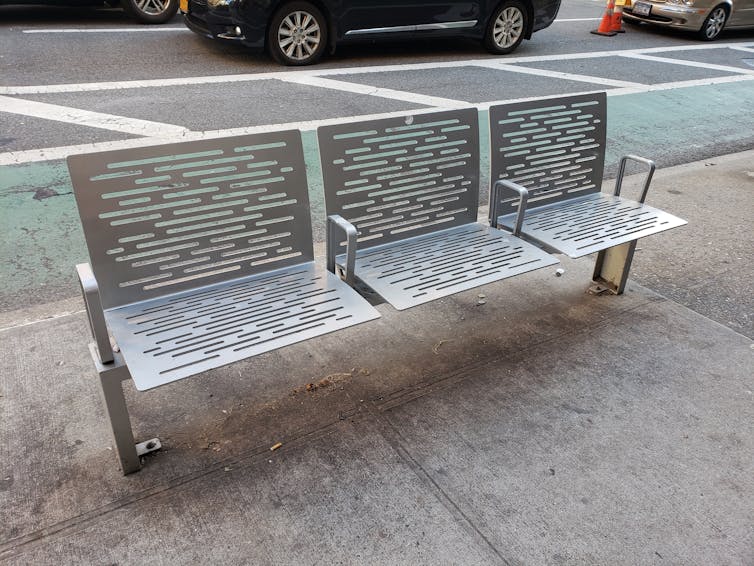
Robert Rosenberger
Rather than add armrests to a bench, the bench can be simply taken away. Trees can be removed to prevent loitering in the shade. Whole regions of cities are devoid of public restrooms, with options in private establishments available to paying customers only. Public space researcher Cara Chellew has come to refer to these conspicuously absent expected things as “ghost amenities.”
Hostile architecture, however, is only the tip of the iceberg. Just below the surface are the variety of laws that target particular behaviors: storing personal items in public space, loitering, panhandling and vagrancy. There are laws against sitting or lying down in public – so-called sit/lie laws. Anti-camping laws often apply not just to tents but to using any kind of covering at all, such as a blanket.
Even giving food to unhoused people is outlawed in some cities, if the individual or organization does not have a permit.
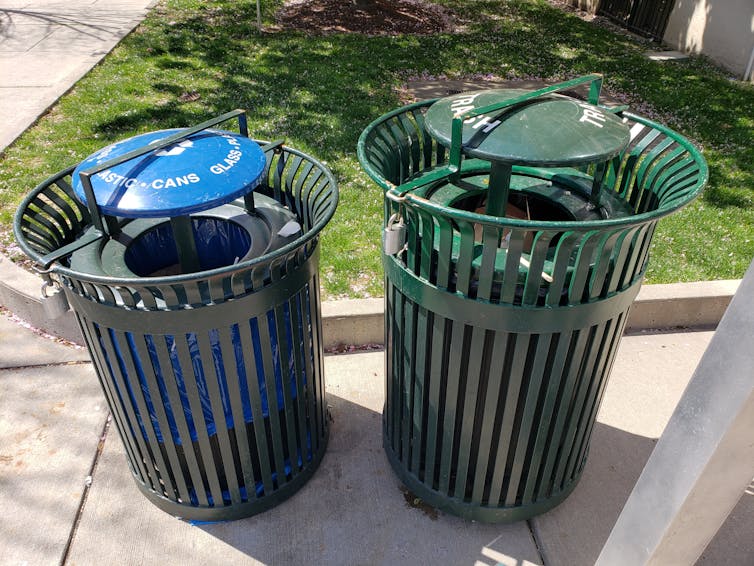
Robert Rosenberger
The National Homelessness Law Center has been charting the increase in these kinds of laws across the United States. In a review of 187 cities from 2006-2019, the center found a 78% increase in sit/lie laws and a 103% increase in laws against vagrancy, loafing and loitering. There was also a 92% increase in camping bans.
Informal policies can also serve as de facto bans on homelessness, such as when police pressure unhoused people to move along.
Many shelters, where they exist, are not open during daytime hours, leaving people without housing no choice but to loiter or continue moving throughout the day.
At times, shelters themselves present roadblocks that discourage people from using their services, such as patterns of discrimination against LGBTQ+ patrons or policies that ban pets.
Stakes at SCOTUS
On their own, many of these laws or objects may seem unobjectionable, or at least not a big deal. How much should we care about a bench with armrests, or a park with rules prohibiting sleeping?
When taken in the aggregate, however, these things can function together to exclude the unhoused from public space entirely. None of them literally make homelessness a crime – but in critics’ eyes, these laws and patterns of design have the same effect. The court’s decision on Grants Pass v. Johnson will determine whether treating unhoused people as criminals is constitutional.
Robert Rosenberger, Professor, School of Public Policy, Georgia Institute of Technology
This article is republished from The Conversation under a Creative Commons license. Read the original article.
![]()
Robert Rosenberger is a Professor at the School of Public Policy, Georgia Institute of Technology.





























Al says
Why not publish your address as the author of this junk article. We can then direct all the homeless to your neighborhood, I’m sure that you’ll enjoy the company.
This sounds just like the illegals going to sanctuary cites. The cites were all gung-ho until it became thier problem, not so much fun for them now. If you need to have a bleeding heart to make yourself feel good, great. Now use your resources to help not everybody else’s.
Jason Barton says
That’s quite the attitude, you probably even consider yourself a Christian. Strange, you would likely object to tax money going to create shelters, and programs to address issues of homelessness like mental illness and substance abuse, but you will be perfectly fine with your tax money going to pay for more police and more prisons that will invariably be needed if we don’t address the causes of homelessness … your choice. What would Jesus do?
Mary Fusco says
Jason, some people are homeless because they have no other choice and others are homeless because it is their choice. People have to want help and most don’t. My daughter is a home health nurse in JAX. She is on the road 8+ hours a day. She needs to use gas/convenience stores to use the restroom and get something to drink or eat. She is constantly harassed by those lounging outside and begging for money. She carries no cash. When she tells them that, she is called names that I could not even say here. Not too long ago, she was sitting in her car at one of these establishments making phone calls to Dr’s and patients when a police officer knocked on her window and told her the manager stated she looked suspicious. Yep, a 5′ nurse in scrubs with her badge visible is suspicious while all these guys lounge around in front of the door. We live in a world gone mad.
Joe D says
When I first bought my home in the area, I read that there was only a small church run Temporary shelter in the Flagler Beach/Palm Coast area, and the “official” tally of “homeless” in the area seem INACCURATELY LOW. Even the shelter that did exist seemed to be a cold weather night shelter only opened periodically.
In REALITY, I’ve seen the weekly attendance at my church’s “Community Supper” (ie: soup kitchen) ballon from approximately 100/ day attendees in 2019 to over 200/ day in 2024 for the weekly events Not all are homeless, but many are.
There also appears to be limited resources available to assist the homeless in the area. Some charitable groups supply food, clothing, furniture, and medical /social services to those “marginally” homeless ( commonly referred to as “couch surfing”).
Having been a family and child Master’s prepared Clinical Nurse Therapist and Certified Nurse Case Manager before retirement, I dealt with individuals and FAMILIES experiencing or anticipating homelessness. There were many reasons: loss of a job, medical illness, family dysfunction or abuse, mental illness, drug and alcohol abuse. Some just seemed to REPEATEDLY make bad life choices, which despite help, landed them back on the street.
I would say EARLY intervention in the schools to identify neglect and abuse cases ( not just physical abuse or neglect, but harder to identify EMOTIONAL abuse or neglect). Teachers, school social workers, and nurses USED to be, and in SOME cases still are the front line for those children that you see “falling through the cracks.” Much current regulation (especially in Florida) at the moment, prevents teachers from nurturing and encouraging students who are struggling in their classrooms, homes, and communities. Some teachers are even facing the suspension of their TEACHING licenses over supporting students in a way not approved of by the current Florida Legislature or our current Governor.
Just as the Bible says, “There will always be the poor among us.” You can’t save everyone ( I’ve been told many times in my career, I have a RESCUE complex), but we need to do more in PREVENTING the situations that frequently TRIGGER homelessness.
Mental Health services, early childhood intervention services, improving education, supportive services for struggling families, improvements in Veterans services, and addiction treatment services all appear to be afterthoughts in our community…WAY after expanding PICKLE BALL courts.
Remember: Most of us are 2-3 paychecks (or retirement checks) away from homelessness ourselves! Think about it…
Deborah Coffey says
Thank you. Ways to deal with homelessness and, more importantly to prevent it when possible, seem to be sorely lacking.
Sherry says
Thank you so much Joe D! It’s just so easy to sit in all mighty, “holier than thou” harsh “judgement”, and blame the victims of a society than does very little for those with no bootstraps. You a so right when you say that “most of us are 2-3 paychecks away from homelessness ourselves”. There seems to be zero sense of walking a miles in another’s shoes, no compassion. . . but, by God, plenty of judgement. What Jesus died for seems to have been totally forgotten by many people. . . especially the hard right politicians!
Pogo says
@As stated
Regulator says
I know its going to offend a lot of bleeding hearts but, I agree with you.
JOE D says
For Regulator:
Let’s HOPE you are fortunate never to be faced with a FINANCIAL crisis or a Surprise Medical bill that, throws your life COMPLETELY off balance.
Not ALL homeless are mentally ill ADDICTS, that CHOOSE to live on the streets.
How does that BIBLICAL saying go?
There but for the GRACE of God, go I.”
Hammock Bear says
Please explain the reason it is okay to have our borders open to people from other countries and then we feed and clothe them and create places to live. Often, they bring gifts of disease and killer drugs and even bed bugs. Already in this country we have homeless that many are veterans and elderly and as mentioned above, so many who simply fell on hard times and lost their homes. And many of the Homeless are working but just can’t get ahead to find an affordable place to call home. Close the borders Now and work on helping all who are in need. Keep the ugly politics out of it entirely.
Pogo says
@Oy vey, indeed
Pernicious speech: sufficiently financed, and shamelessly, relentlessly, repeated to credulous recipients.
And here we all are — in the wasteland that greed, hate, ignorance and stupidity have made for themselves, and everyone else.
No piquant bon mot — c’est fini.